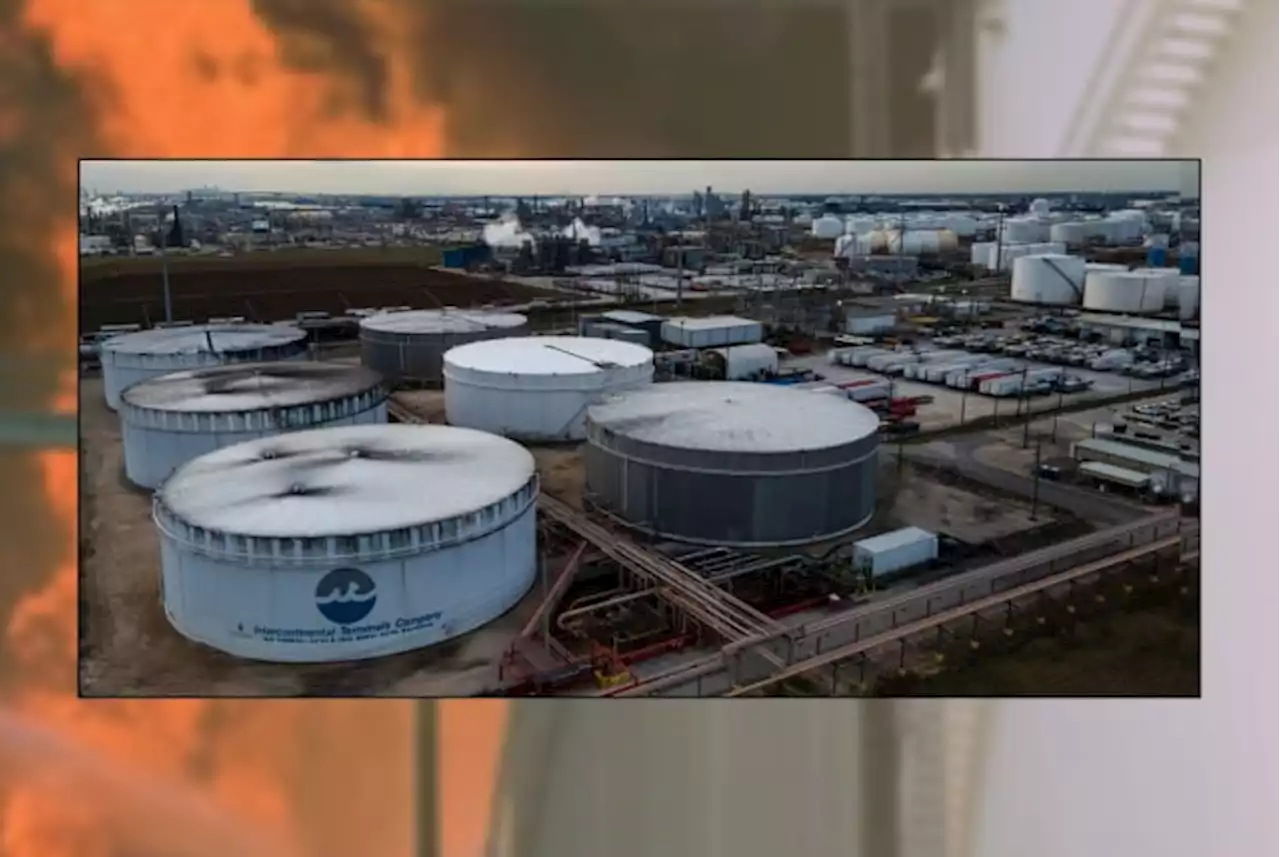Regulators repeatedly documented — but did little to address — problems at a Houston-area tank farm. Then on March 17, 2019, a fire blew through a corner of the facility, releasing toxic chemicals into nearby communities for weeks.
, The Texas Tribune’s daily newsletter that keeps readers up to speed on the most essential Texas news.. Part two will publish on Thursday.
There had been an accident. A facility housing millions of barrels of volatile chemicals was burning a little more than 2 miles away. City officials had issued a shelter-in-place advisory. For 30 years, Garing had worked as a chemical engineer for a branch of the U.S. Environmental Protection Agency that investigates high-stakes cases of industrial pollution. His back stiffened when he saw that the blaze was at Intercontinental Terminals Company, or ITC, in Deer Park.
The story of how this pattern unfolded in Deer Park, a tight-knit city of 30,000 and the self-proclaimed “Birthplace of Texas,” is based on thousands of pages of state and federal documents, on investigative reports and pollution data from the EPA and on eyewitness accounts from residents. It also draws on extensive interviews with a handful of retired government regulators who tried to sound the alarm about ITC years ago and are speaking out now in the hope of preventing future disasters.
Doty had been tracking industrial emissions since 1990, when he went to work for the Texas Air Control Board, an agency that preceded the TCEQ. His ability to interpret complex chemical readings had made him one of its sharpest investigators. His dogged commitment made him one of its toughest.
That intersection “was literally ground zero for benzene,” Doty said. “There were many chemical sources around there, but ITC was right in the middle of it all. It was one of our main focuses.” To Doty, these decisions were just more examples of the TCEQ bending to industry rather than protecting the public.
County officials pounced on the accident. They’d grown frustrated by the TCEQ’s leniency and were beefing up their own air monitoring and investigative efforts. “I created detailed narratives and stories that anybody curious about what was happening at ITC — say, a journalist — could follow up on,” he said. “We were determined to show that ITC’s problems were consistent. They weren’t one-time events.”with Harris County for $95,250 for five chemical leaks caused by operator error. The company agreed to abide by environmental laws and implement better management practices — a promise it failed to keep.
Unbeknownst to Guevara, the EPA — the agency tasked with making sure Texas properly regulated those companies — was entering a period of turmoil. A determined regulator, Debbie Ford, had a front-row seat. “To me, it was simple: The regulations are in place and everybody’s supposed to follow them,” Ford said. “But some companies were able to skirt the rules and receive lax permits thanks to their influence in the state.”
When Public Health Watch asked Region 6 about this exchange, the agency said it “cannot verify an overheard statement.”“I just kept thinking, ‘What the hell have I gotten myself into?’”Ford felt a bit hopeful in 2009, when President Barack Obama chose Alfredo “Al” Armendariz, an engineering professor at Southern Methodist University in Dallas, to lead Region 6.
Armendariz apologized for his word choice, but the damage had been done. The TCEQ described his comments as “outlandish” and “unacceptable and embarrassing.” Perry tweeted that Armendariz’s statements were “another reason to all-but-eliminate EPA.”Despite the turmoil at the top of Region 6, the staff in the air enforcement division pushed on.
Hoyt was equipped with a photoionization detector that took instant readings, but the sheer number of tanks, and the fact that they were so close together, made it difficult to pinpoint the leaks’ sources. Some of the tanks stood 40 feet tall and 120 feet in diameter, so mapping the flow of air through the complex — a critical aspect of monitoring — was challenging.
Garing was a chemical engineer for the team. He knew the petrochemical industry inside and out. Before he joined the NEIC in 1987, he’d worked as a chemical engineer for Conoco. By the time Region 6 asked him to measure benzene emissions in eastern Harris County, he’d inspected nearly 100 plants and refineries.
The strong odor of chemicals hung heavy in the cool Texas air that morning as Garing entered the complex. Hulking cylindrical tanks lined either side of the road like guardsmen standing at attention. Trains loaded with petrochemicals rumbled nearby. Garing had been using the GMAP for more than three years. But he said he’d never seen benzene levels as high as those it recorded inside ITC that day. In one part of the facility, the readings exceeded 1,000 parts per billion — more than 10 times higher than what the National Institute for Occupational Safety and Health advises for workers.
NEIC delivered its findings to Region 6, which was responsible for investigating whether any of the high benzene readings exceeded ITC’s permit.There is no record of Region 6 having drafted a 114 letter — a critical precursor to enforcement — or of any fines being levied or any corrective actions taken after the inspection.
Eddie started as a contractor when he was just 18 and taking night classes at San Jacinto College. Three months later, he got a full-time job at a chemical company and dropped out of school. His starting salary was $70,000. The fire marshal’s office described what happened about a half-hour later, when an ITC supervisor was testing a tank. He heard the groans of metal grinding in the distance, but assumed it was two rail cars coupling together.
The tank farm also didn’t have an automatic sprinkler system, the fire marshal’s report said. The facility’s on-call fire team was still minutes away, so the ITC supervisor sprinted toward the nearest firefighting station. As he got closer, he saw that tank 80-8 was at the center of the inferno.
Canada Latest News, Canada Headlines
Similar News:You can also read news stories similar to this one that we have collected from other news sources.
 Houston shooting: 3 charged in murder of Houston mechanic, father 2 days before ChristmasSHOOTING UPDATE: Three of the men suspected to be involved in the murder of a Houston mechanic and father days before Christmas have been arrested and charged. houstonshooting
Houston shooting: 3 charged in murder of Houston mechanic, father 2 days before ChristmasSHOOTING UPDATE: Three of the men suspected to be involved in the murder of a Houston mechanic and father days before Christmas have been arrested and charged. houstonshooting
Read more »
 New draft of House stablecoin regulation focuses on state regulators, issuersThe bill is intended to restart negotiations with Democrats in the Senate and the White House over stablecoin regulation.
New draft of House stablecoin regulation focuses on state regulators, issuersThe bill is intended to restart negotiations with Democrats in the Senate and the White House over stablecoin regulation.
Read more »
'Crypto is dead in America' as regulators target sector: Palihapitiya'Crypto is dead in America' as US regulators target the sector for threatening the establishment, Chamath Palihapitiya says
Read more »
 Federal regulators call AI discrimination a ‘new civil rights frontier’Biden administration officials promise enforce existing civil rights laws against AI systems that perpetuate bias and discrimination
Federal regulators call AI discrimination a ‘new civil rights frontier’Biden administration officials promise enforce existing civil rights laws against AI systems that perpetuate bias and discrimination
Read more »
 US regulators plan to go after harmful AI business practicesU.S. market regulators say AI tools are subject to the same legal standards as any other business tools.
US regulators plan to go after harmful AI business practicesU.S. market regulators say AI tools are subject to the same legal standards as any other business tools.
Read more »
 Microsoft’s Activision Blizzard acquisition blocked by UK regulatorsMicrosoft says it will appeal the decision
Microsoft’s Activision Blizzard acquisition blocked by UK regulatorsMicrosoft says it will appeal the decision
Read more »
